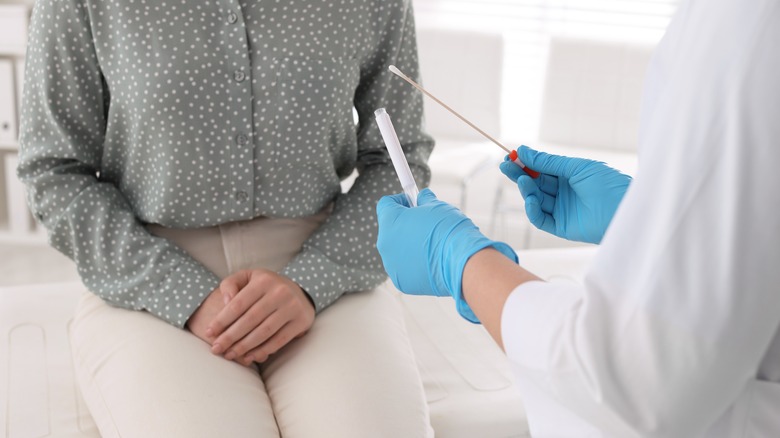What Happens If Gonorrhea Goes Untreated?
Gonorrhea is a sexually transmitted disease caused by the bacteria Neisseria gonorrhoeae, which affects the vagina, anus, eyes, and throat (via Healthline). According to the Centers for Disease Control and Prevention (CDC), gonorrhea is more common in young people between 15 and 24 years. However, anyone, regardless of age or gender, can contract or transmit gonorrhea by having oral, anal, or vaginal sex, says Healthline. According to the CDC, if you're pregnant, you can also pass gonorrhea to your unborn child, hence why a gonorrhea infection should never be left untreated.
According to a 2022 article published in the journal StatPearls, Neisseria gonorrhoeae is the second most reported sexually transmitted disease in the United States. The World Health Organization estimates that providers receive 106 million new gonorrhea cases worldwide, and many more of these infections go unreported, which is where the danger lies.
The factors contributing to the high prevalence rate of gonorrhea infections include unsafe sex, multiple partners, and previously diagnosed diseases, per this 2019 study published in the journal PLOS One. The study adds that there may be other risk factors like alcohol abuse, but how it affects the incidence rate of gonorrhea is not exactly known.
If left untreated, gonorrhea can cause some health issues, says Healthline. For this reason, it would be best to visit your doctor, who can prescribe the right treatment.
What are the complications of untreated gonorrhea?
Gonorrhea comes with a number of symptoms and health concerns. According to Healthline, not everyone with gonorrhea will experience symptoms, even though they can transmit the disease.
Furthermore, the symptoms may vary depending on your sex. Some women will experience watery, creamy, or greenish discharge from the vagina, says Healthline. In addition, gonorrhea can cause heavier periods, excessive bleeding, pain in the lower abdomen, and pain during vaginal sexual intercourse (via the Cleveland Clinic). Men can also experience unusual discharge from the penis, painful or swollen testicles, and a painful sensation when urinating. However, it may take several months for men to notice they have been infected, per the clinic.
If left untreated, gonorrhea can be dangerous, and complications can arise over time. According to the CDC, untreated gonorrhea can leave you susceptible to disseminated gonococcal infection, usually characterized by life-threatening symptoms including arthritis, tenosynovitis, and/or dermatitis. Gonorrhea can also spread into the uterus or fallopian tubes, causing serious and permanent health problems for women, including pelvic inflammatory disease, which may make you susceptible to ectopic pregnancy or infertility, says the CDC. In rare cases, gonorrhea can enter the bloodstream and can cause complications to appear on the skin with symptoms ranging from rashes to skin sores, says Stanford Medicine Health Care). Symptoms can also include swelling, fever, and joint pain.
How is gonorrhea treated?
Gonorrhea treatment often involves antibiotics, and your doctor might start you with a single dose of 500 milligrams of intramuscular ceftriaxone (Rocephin). You should inform your doctor of any allergies you have so he or she can determine if this medication is right for you. Antibiotics usually work differently for different people and you should also report your progress to your doctor, who will determine when it's best to have sex again. According to WebMD, waiting at least seven days after treatment is best.
Beyond sexual intercourse, gonorrhea can pass from mother to baby. According to the National Health Service (NHS), babies with signs of gonorrhea infection at birth may be prescribed antibiotics to help prevent complications like blindness.
According to the CDC, medications may stop the infection, but they will not repair permanent damages associated with gonorrhea. Over the years, antimicrobial resistance among gonorrhea patients has become a major concern. The CDC advises men and women with gonorrhea to retest three months after treating the initial infection, even if they believe their sex partners have been successfully treated. In cases where symptoms persist for more than a few days, they recommend visiting your doctor for re-evaluation.



